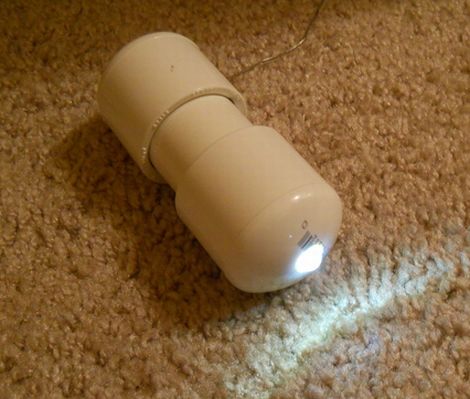
If you’re in search of a flashlight that can stand up to the elements, or simply looking for an easy way to spruce up your pool for those hot summer nights, check out these rechargeable PVC LED lights. Inspired by a post in Make: Magazine featuring Indestructible LED Lanterns, [John Duffy] decided to take the project one step further.
While he liked Make’s iteration of the waterproof lantern, he thought it would be best to permanently seal the lights for maximum durability. Not satisfied with a one-use light, he equipped the PVC lanterns with a single rechargeable AA battery, step-up circuitry to drive the LED, and an inductive charging coil.
His floating, waterproof lights sport a slightly bigger footprint than their predecessors to house the extra electronics, but we think that’s more than a fair trade off considering they can be charged wirelessly.
Place your Digikey/Mouser/Jameco orders now and check out [John’s] how-to video – you just might get some of these built in time for the weekend!
[via HackedGadgets]
[brightcove vid=1678050992001&exp3=991410168001&surl=http://c.brightcove.com/services&pubid=1568176135&pk=AQ~~,AAAAAETaO0s~,cVbOypIs9tHUVW57d5nJxZGxNa9O_LLK&w=470&h=412]















oh my god, it’s an LED flashlight
I think you’re missing the point and despite the flashlight it’s self not being built all that great the point is that this kid built a wireless charger.
I can’t tell if you’re being sarcastic or not but if you are why put this guy down?
It’s a very basic concept… but good for him.
the kids brilliant. someones going to say something negative here without looking into it properly. good work kid.
Or just buy something from dealextreme. I already saw no paint in the Make project, except if you needs lots of them…
Aren’t you missing the point?
Much of what appears on Hackaday can be purchased– pretty much always for less than the cost of your time, labor, and the retail price of parts.
This web site isn’t about make-vs-buy. The purpose of this site is to celebrate the projects of people who “hack.”
Exercising his brain: 1 point.
Using hand tools to actually fabricate something physical and tangible. 1 point.
Project actually works: 1 point.
Evaluation and planning for improvements: 1 point.
This kid is 4 points ahead of 98% of the general populace. More power to him, I say.
Hear Hear!
very very well put.
98% seems low.
I would like to add another led to the other side, maybe a bit of fiber to make lots of little dots (and save on needing more power). Throw a bunch of them in a pool.
Obviously he used the “LED flashlight” part of this project because he couldn’t think of anything else he’d like to charge using the wireless method.
Great job kid awesome project. I have a feeling we will be seeing a lot more from this kid.
So you hated vimeo, now take this!
I agree regarding Vimeo, and BrightCove is substantially worse (like digging through the article’s source code to find the 4 pieces of info required to embed).
But, if I have the option to embed an annoying video player or hear about how we never linked the video, I will go with the former.
This had more of a sarcastic tone to those who keep complaining about vimeo every time ;) Although I admit, I hate vimeo too. Boo!
This is all and well until it explodes from offgassing of hydrogen in the battery, assuming he used NiMH.
Even without an explosion, you’ll quickly ruin your battery without any regulation on the charging voltage. For a quick fix, a 1.2V(depending on chemistry) linear voltage regulator between the coil and battery should prevent overcharging.
Overall, Nice idea. Personally I’d replace the 555 with a 6-8 pin microcontroller for lower parts count and flexibility.
I don’t think thats really a problem, seeing as NiMH batteries can be safely charged constantly (at a low rate, eg. 0.1C).
Since he’s using LEDs as the rectifier diodes on the secondary, it would appear that the charging current is only on the order of 20mA…. far below the 0.1C rate for most NiMH AA cells (~200mA).
Only thing I would change it to ditch the battery and use a capacitor to extend the lifespan of the usefulness without having to ever crack it open. Otherwise, great project. I might make some of these with my kids since they always want to use my big 4D flashlights and drain the batteries.
Awesome. Can be improved, but keep the good work. Beats spending time in front of a console, like >95% of other kids do.
Just hope you don’t have to get through TSA with that thing
Fill it with mineral oil so it will be pressure compensated.
It might be a challenge to close and seal this properly if it’s filled with oil to such an extent that it would resist external pressure.
Neat! I’m going to take this idea and mod it to fit my needs. Hack my solar powered garden stakes into waterproof pool lights. With a downward firing LED, They run off 1 AA, with a small solar cell, and are plenty bright, cheap too.
This is a really great idea and could be expanded into something even better. Well done.